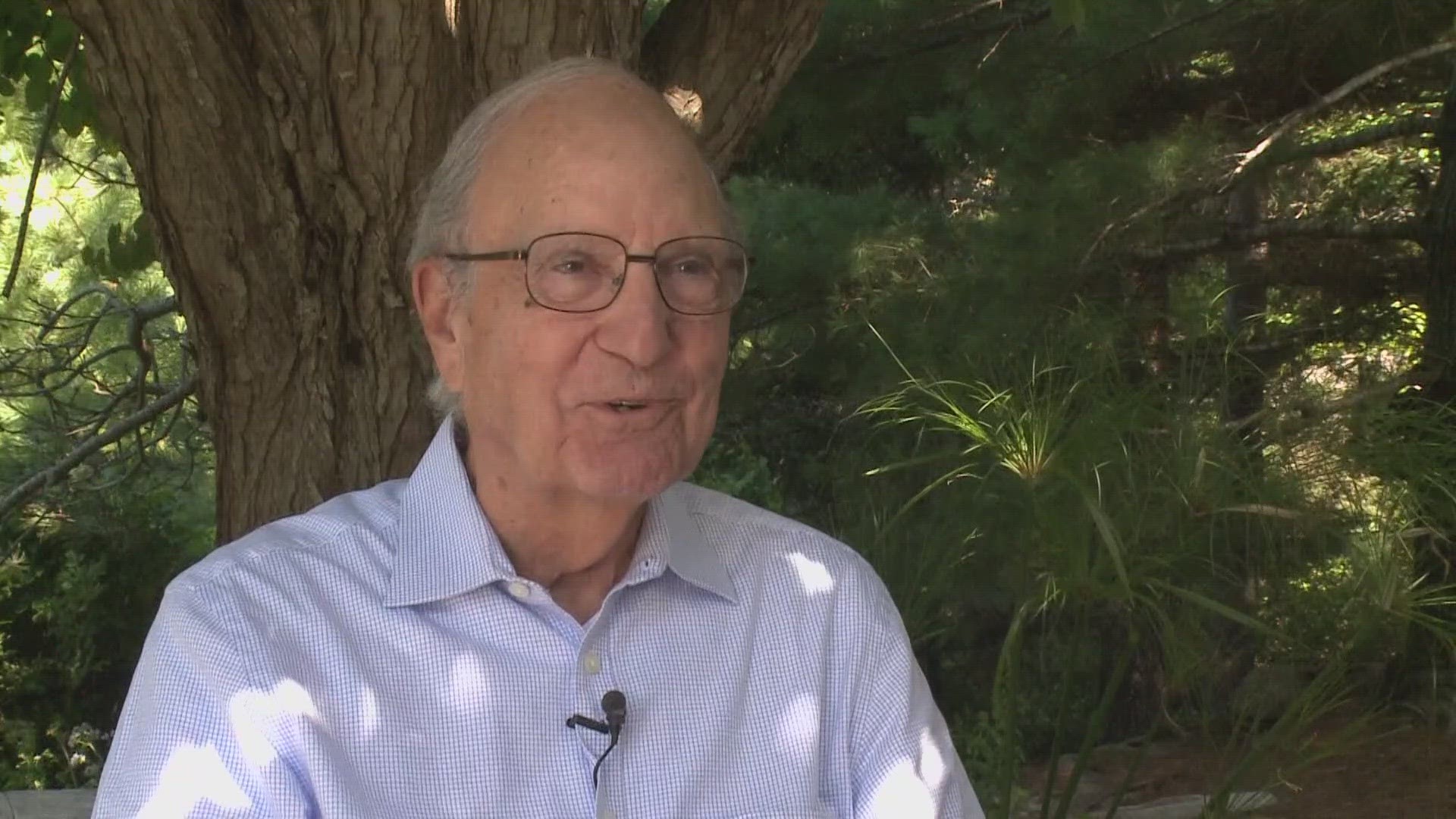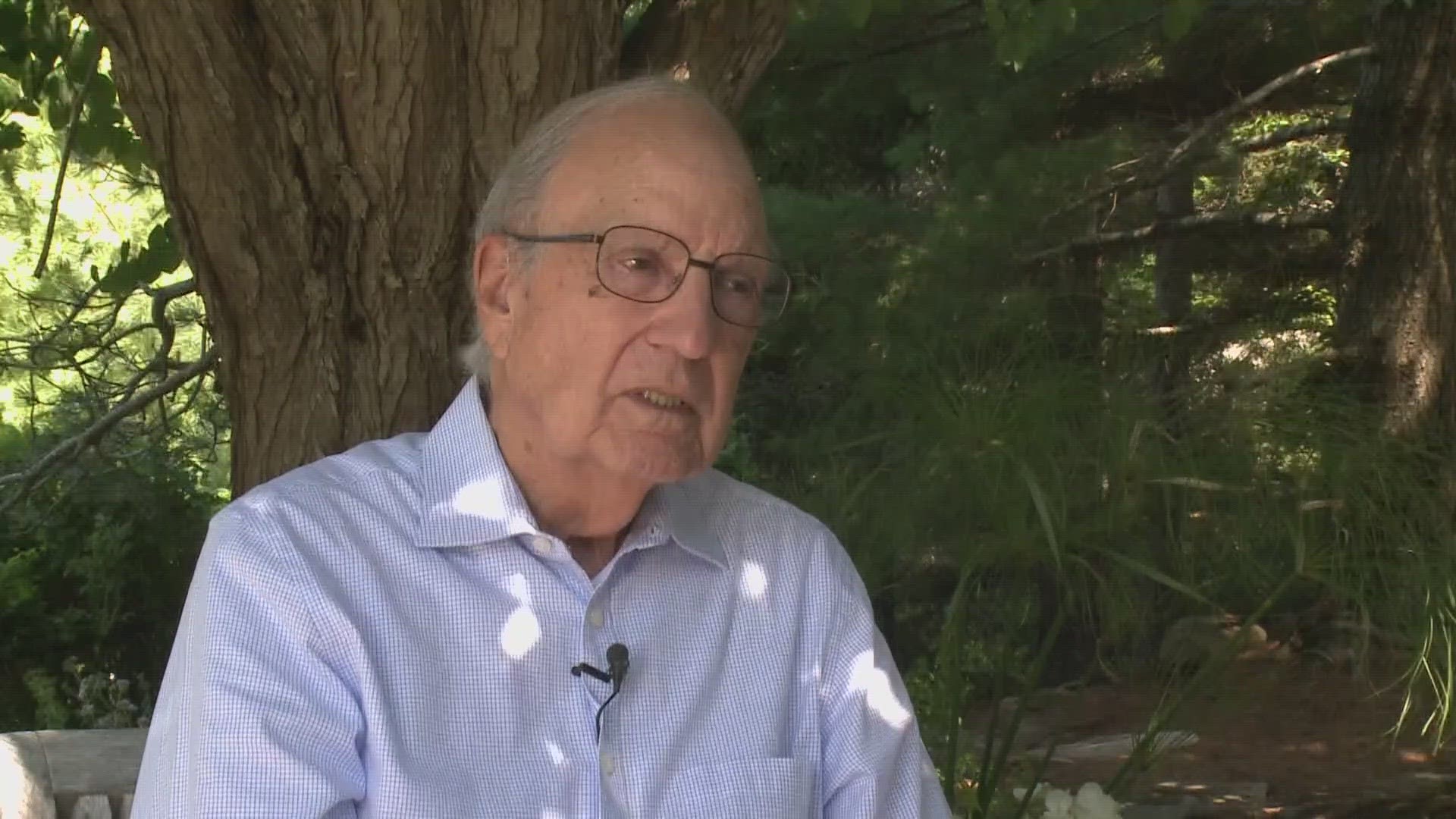MOUNT DESERT, Maine — George Mitchell smiled as he showed the view from his front deck in Seal Harbor, over the trees to Frenchman Bay in the distance. For a man who spent years helping watch over the country and the world, the spot has been a source of relaxation. Like so much in the former senator’s life, it came as the result of hard work.
Mitchell said it was soon after he was appointed to the U.S. Senate in 1980 that a connection began with Mount Desert Island. He had been selected to fill the remaining term of former Maine Sen. Ed Muskie, who had just been named U.S. Secretary of State by President Jimmy Carter.
"I was meeting the Muskie staff in Washington and asking them what they were working on," Mitchell, who had worked on Muskie’s staff himself more than 15 years earlier, explained.
He said one staff member showed him work he was doing relating to boundary issues with Acadia National Park. That led Mitchell to connections with a range of people on MDI, and he eventually built a summer home on the island long after he retired from the Senate.
Mitchell is about to celebrate his 90th birthday, a time of reflection for any who reach that milestone. As he sat on a shaded patio beside the house, he talked about growing up poor in Waterville, and the path that led him over the years to one of the most powerful positions in the American government, and finally, to the role of a peace negotiator.
"I graduated from Waterville High School when I was 16 years old," Mitchell said. "I was young, immature, insecure, had no real plan for my life. [I] had no money, my father was out of work at the time, so there was a question if I would even get to go to college. But I was very lucky, received helping hands along the way, and I was able to go to Bowdoin [College] and graduate."
That education opened up a world to the young man, and he stepped into it.
Step one was enlisting in the U.S. Army, which at the time was not uncommon for men of his age.
Mitchell said he was sent to Army intelligence school, then posted to Berlin, Germany. His job, Mitchell said, was interviewing refugees leaving Eastern Europe to make sure they were not Soviet spies. At the same time, he said, they would be looking for good candidates to send back into Communist areas to spy for the U.S.
"And I loved it, liked the work, liked the people. And I did well, was encouraged to stay, and I came this close to making Army intelligence my career."
Mitchell said the Central Intelligence Agency recruited him, too, but he opted for law school, where he took classes at night and worked as an insurance adjuster during the day for four years until he graduated.
When no Maine firm wanted to hire the brand new lawyer, Mitchell took a job with the U.S. Justice Department. Two years later, he said, Sen. Muskie offered him a job. Muskie knew of Mitchell because Muskie’s wife was from Waterville and knew his older brothers, Mitchell remembered. He took the job, and it opened a new path for the future.
"I truly loved and admired Senator Muskie. He was and remains one of the greatest persons I ever met, a profound influence in my life and career, and by the time I left [Muskie’s staff] I was interested in politics."
That interest showed up in work for the Democratic party over the next few years. Then, in 1974, Mitchell was the Democratic candidate for governor of Maine. In a tough, three-way race with Republican Jim Erwin and Independent Jim Longley, Mitchell came in second—the only statewide election he would ever lose.
Mitchell’s public career, however, still moved ahead. President Carter named him U.S. Attorney for Maine, at the recommendation of Sen. Muskie, and then Mitchell was appointed as a federal judge, which was a lifetime job.
Then, after only a year as a judge, politics re-entered his life.
Sen. Muskie was named U.S. Secretary of State, and Maine Gov. Joe Brennan at the time appointed Mitchell to serve out the remaining two years of Muskie’s term.
While Mitchell was already an experienced lawyer, had worked in the Senate, and served as a federal prosecutor and judge, he said the Senate position intimidated him.
"I was just thinking about how to survive in the Senate," Mitchell said, 43 years later. "I was an appointed senator to replace one of the greatest men in Maine history ... and I did not know if I would be adequate to the task."
He also faced an election in 1982 to keep the Senate seat. GOP Congressman David Emery challenged Mitchell and showed a big lead in early polling. Mitchell, the incumbent, was the underdog in the race.
"That’s a period when my self-doubt intensified, but also my determination. So, I decided I could do no more than continue to do what I was doing but work harder at it. So instead of attending six events a day, I would do 10 events a day,"
The work paid off. Mitchell won a full Senate term in the 1982 election. That achievement led Senate Democratic leaders to put Mitchell in charge of their party’s campaign to win back control of the Senate in 1986. Mitchell said he raised money, recruited candidates, and did, indeed, win back control of the Senate for the party.
In return, two years later, Democrats chose Mitchell to be Senate Majority Leader, one of the most powerful positions. Mitchell said he immediately met with Sen. Bob Dole, the Republican leader who had served as Senate Majority Leader himself. Mitchell said he pledged to show Dole respect and fair treatment, even though they disagreed politically.
"If the leaders don’t trust each other it becomes unbearable," Mitchell stated, as he looked back at those days. "And then I said [I would follow] the most basic standards of fairness, honesty, and I promised I would never personally attack him. I would criticize policy and he would mine, but never attack him."
Mitchell recalled their relationship.
"And when we had debates on issues we disagreed, which was almost every day, we didn’t make it personal. You can stick to the issues but not insult the person holding a different view. You can respect the person holding a different view," Mitchell added.
The former senator agreed that the standard doesn’t seem to be followed in the current political atmosphere, but chose not to comment further on the political climate of 2023.
"It's deeply distressing," was his sole comment.
Having said that, perhaps with the long view that comes with age, Mitchell said he still has hope the political climate will improve.
"I console myself with this thought. Life is change for every human being, every society, every government," Mitchell said.
"There are cycles in life. There are periods when things have gone well, periods when they have gone badly, I’ve won some elections, lost some elections. I’ve gotten some legislation passed in the Senate, I’ve failed to get other legislation passed," Mitchell continued. "I was able to chair negotiations for a peace agreement in Northern Ireland. I went to the Middle East and couldn’t do that. So life has ups and downs for everyone. And the same is true of our country."
Despite all the national discord, Mitchell, at 90, said he is still optimistic about the future of America.
"But I think we are going to come out of this because Martin Luther King said, 'the arc of history bends toward justice.' And I believe that to be true, but he should have added [it happens] very slowly," Mitchell said.
When asked what he is proudest of in his long career, besides the achievement of becoming Senate Majority Leader, Mitchell listed two accomplishments, both of which will likely be his legacy— one to the world, the other to Maine.
He said negotiating the peace accords in Northern Ireland 25 years ago remains one of his proudest achievements.
"In a way, that was imperfect," he said. "The 25-year scope didn’t solve all the problems but it was a political compromise that succeeded in ending violence."
That agreement has had challenges over the past 25 years, he added, but it has held and has saved thousands of lives.
His other legacy may be more personal—the young people of Maine.
As a senator, Mitchell had made it a point to visit and speak at every Maine high school and said those visits made an impact.
"They talked at great length about lives and families and hopes. And I saw in their eyes and heard in their voices mirror images of myself at that age," he recounted.
That led back to the stories of his poor upbringing, and the people who helped him, so long ago.
"So I made up my mind I would create this scholarship fund so that hopefully every child in Maine who has aspirations and hopes, talents and dreams, [can go] as far and high as they could," Mitchell said.
Mitchell’s surprise retirement from the Senate in 1994 provided the seeds for that vision to grow. He took the money that had been donated for a re-election campaign fund and used it—with donor permission—to begin the scholarship fund now managed by the Mitchell Institute. Further donations and investments have grown the fund significantly over the years. The former senator said it has, thus far, granted $26 million in scholarships to promising Maine high school graduates.
"So, it's been a quarter century since the scholarship program was created, and we’ve been able to provide scholarships to 3,600 Maine students from every part of the state. Every single Maine high school participates."
The scholarships are $10,000 spread over four years of college. Institute leaders say they have also provided some scholarships to attend two-year technical schools.
As valuable as the money, in many cases, has been the help and mentoring institute staff and others provide the students to help them succeed.
Mitchell said those thousands of graduates, and the students coming behind them, are the next generations of Maine.
"There are businessmen and women, entrepreneurs, doctors, lawyers, nurses, teachers. Just about everything you can imagine," Mitchell said, with obvious pride.
We said that his life, in many ways, embodies the classic American story, from poor beginnings to the pinnacles of success, achievement, and respect. Mitchell agreed with that assessment.
"My parents had no money, lived their entire lives on the edge of financial insecurity. But they had a dream that their children would get an education and have chances in life they never had. And we did, all five of us graduated college and had a life my parents could never imagine, let alone know about. I feel very much my life has vindicated our parents' lives," Mitchell said.
The former senator, judge, Army officer, and peace negotiator said he believes the American Dream still exists and is still available for others. And believes in the country, despite its flaws.
"This really is the greatest country in all of human history. So much to be proud of, yet so many failures, disastrous failures," Mitchell said. "But we have always come to recognize and do our best to correct [those failures]."
"I’m very optimistic about America. I think my children will live in a society better than the one we live in," Mitchell added.


